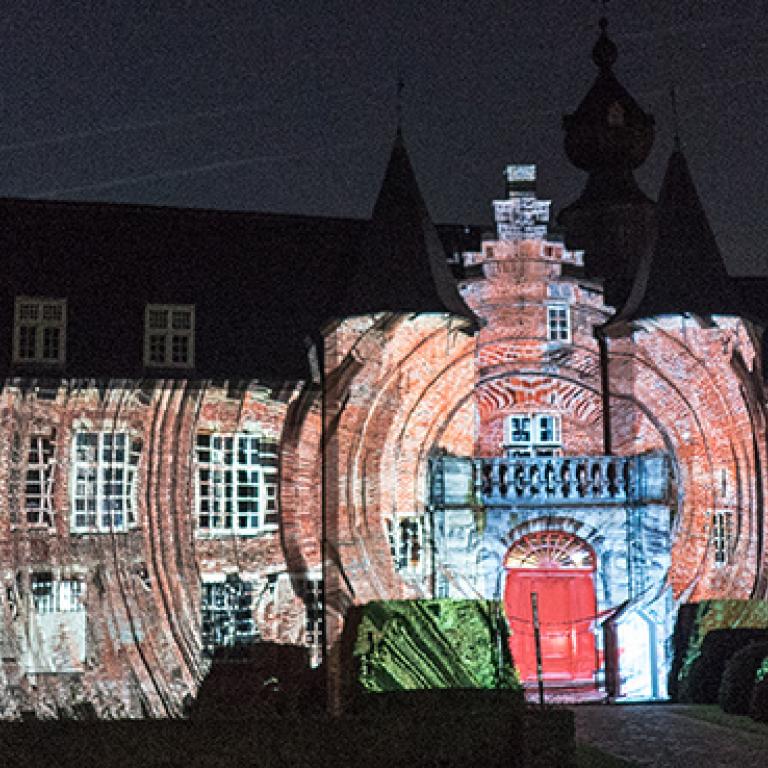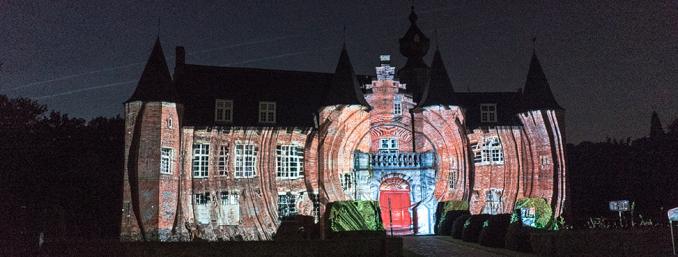
Interview with Alexander Stragier – light artist
Bringing objects’ details to the forefront by adding a dimension of light. Not with spectacular effects, but with just some
subtle touches. That’s the basis of the artwork of Alexander Stragier (24) of Limen Visual (Roeselare, BE). We had a chat
with our home town’s promising visual artist.
beMatrix has been following you for a while, but how did they get to know about you?
“I design audiovisual installations with light as a key tool. Via 3D projection mapping, I project moving images onto buildings, cars and objects. With that added dimension, the illuminated surface comes to life. I always strive to create optical illusions that trigger emotions and magic. You could compare it to the Ghent Light Festival, only my style is subtler. That inspiring combo of light and motion has been the whole idea behind MOTIONskin®, the only difference being the light source placement behind the object, rather than in front. Since there are similarities, beMatrix approached me for some tests with this new technique. The result premièred at the ISE in Amsterdam last February – and everyone was enthusiastic.”
How did you become the video artist you are today?
“To go back to the very beginning, we have to start when I was still a child. Using a mainstream projector my parents bought me – after much convincing –, I experimented to my heart’s delight on the white cellar wall. During my student years at the academy and during a course in visual animation, my fascination for the uncountable ways light can be used, grew even stronger. In fifth grade, I switched to arts education and when I was just 18, I was elected cultural ambassador of Roeselare. Meanwhile, projection mapping got me hooked and I wanted to pursue this art form. As a result, I quit my studies in multimedia and communication technology to start my own business and become a self-made man. It has been five years since then, and I am creatively building my road ahead with Limen Visual.”
In what way does your work stand out?
“I find myself in a niche market, so there is not a lot of competition, especially not in Belgium. However, I go for ‘less is more’. Rather than pursuing massive growth by commercialising my most successful installations, I want to keep working on my personal signature style: highlighting details in an aesthetic way and using light to make objects look different. The artistic side of what I do remains primordial. I try to be as unique as possible with my installations. One of my examples for instance is French light artist Joanie Lemercier, but I will never copy him. Even though I use the same techniques, I will always look fo different ways to apply them.”
How do light and motion add value to a stand?
“The majority of exhibitors want to attract attention by standing out as much as possible, using flashy light spectacles or simply by running their YouTube corporate videos on a flatscreen. To me, it can all be done in a much subtler way, and MOTIONskin® is the perfect solution in that sense. Light animation can help you showcase your product in a more aesthetic and dynami fashion, it adds a certain mysticism, with the images literally drawing people in. They will want to touch what they see. That is what I aim for with my installations.”
How do you see trade fairs evolve over the coming years?
“When it comes to creating spectacular crowd pleasers, I guess we have seen almost everything, so I don’t expect a lot of change related to light and motion. Technically everything has come to maturity, but my guess is that the way techniques are applied will change. People will no longer want to pull out all the stops with a combination of several audiovisual master strokes, but rather go a level deeper and provide an all-in-one experience. Over the last years, stands have become more minimal and cleaner, which will translate into the standards for content as well. Many stands are a customised design, and the digital content has to become customised as well. However, the use of light and motion as a proper design feature depends on the budget exhibitors can and want to set aside for this kind of digital content. I hope my installations will convince them to take that step.”
From paper to digital image? Go to www.limenvisual.be to discover Alexander’s light creations.
Read more in our beMagazine. Click here to request a printed copy or view the magazine online below.
